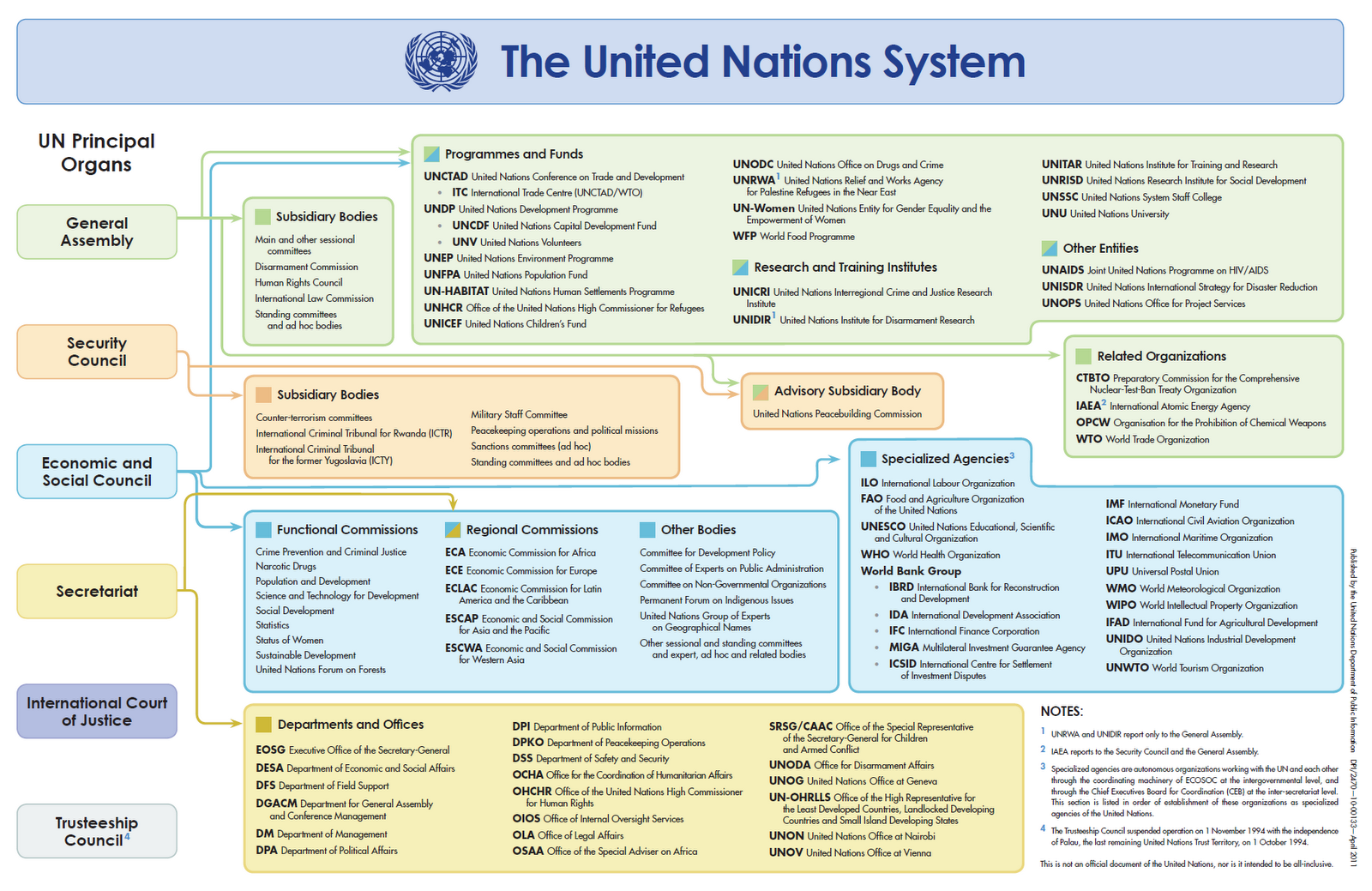The United Nations and Its Organs

Origins of the United Nations
Following World War I, the League of Nations was formed to prevent future wars but proved ineffective, particularly due to the United States' isolationism. The US didn't account for the effects its new status as a major power would have on global order if it remained isolated. The League's weakness contributed to the outbreak of World War II. In the final months of World War II, states convened to establish a more effective international organization, leading to the creation of the United Nations.
Formation of the United Nations
The United Nations was officially established on October 24, 1945, after the UN Charter was ratified by the five main allies: the United States, the United Kingdom, France, the Soviet Union, and China, along with a majority of other signatories. The General Assembly first convened on January 10, 1946, in Methodist Central Hall in Westminster, with the Security Council following suit a week later. The General Assembly adopted its first resolution, concerning the problems raised by the discovery of atomic energy, shortly thereafter. This committee included the members of the Security Council and, when it's not on the council, Canada.
Principal Organs of the UN
The UN comprises six principal organs:
General Assembly
Security Council
Economic and Social Council
International Court of Justice (ICJ)
Secretariat
Trusteeship Council (currently inactive)
With the exception of the ICJ, which is located at The Hague in the Netherlands, all principal organs are located at the UN headquarters in New York.
General Assembly
The General Assembly consists of representatives from all member states, serving as the primary deliberative body of the UN and a forum for high-profile diplomacy. The yearly session includes ambassadors and heads of state. The Assembly addresses international peace, the admission of member states, and the UN budget. Decisions on these issues require a two-thirds majority, while other votes pass with a simple majority. The Assembly is led by a president elected for a one-year term, often allowing smaller states to take a leading role on the world stage. States such as Mexico, Afghanistan, Liberia, and St. Lucia have held this position.
Security Council
The Security Council is responsible for maintaining international peace and security. It consists of 15 member states, including 5 permanent members (the United States, the United Kingdom, France, the Russian Federation, and the People's Republic of China) and 10 rotating members elected for two-year terms. In the current year India, Ireland, Kenya, Mexico, and Norway will rotate out, while Albania, Brazil, Gabon, Ghana, and the United Arab Emirates rotate next year. The Soviet Union's permanent seat was passed to the Russian Federation following the Soviet fall. The People's Republic of China replaced the Republic of China (Taiwan) on October 25, 1971, and Taiwan has since lost even its observer status.
Security Council Resolutions and Veto Power
Security Council resolutions are binding on all member states and can include mandating peaceful resolutions, imposing sanctions, authorizing peacekeeping forces, and authorizing the use of force. However, the five permanent members have the veto power, which can prevent the passage of resolutions affecting their interests, potentially leading states to rely on customary international law for dispute resolution. (US, UK, China, Russia, France)
Economic and Social Council
The Economic and Social Council addresses matters of economy, social welfare, environment, and international development. It has 54 members elected by the General Assembly for three-year terms, with 18 seats up for election each year. The Council oversees approximately 30 subsidiary bodies dealing with a range of issues, including regional commissions, criminal justice, women's rights, geographical names, and economic, social, and cultural rights.

International Court of Justice (ICJ)
The International Court of Justice (ICJ), located at The Hague, is the UN's main judicial body, ruling on international law matters and issuing advisory opinions. It consists of 15 judges nominated by the Permanent Council of Arbitration and elected by both the General Assembly and the Security Council. Judges must be from different states and cannot hold political, administrative, or professional office during their nine-year terms. The Court may form chambers of three judges to handle specific cases, with decisions carrying the full Court's weight. The ICJ relies on state consent for jurisdiction, which can be established through special agreements, treaty provisions, or declarations of consent under the ICJ statute.
The Secretariat
The Secretariat is the UN's operational body, led by the Secretary-General and responsible for day-to-day administrative functions. The Secretary-General is nominated by the Security Council and elected by the General Assembly for a renewable five-year term. Thousands of UN staff members assist in carrying out UN missions worldwide.
Trusteeship Council
The Trusteeship Council was established in 1945 to supervise 11 UN trust territories, guiding them toward self-government or independence. The Council initially met annually but suspended operations in 1994 once all trust territories had achieved self-governance. It remains inactive but retains a president and vice president. There have been discussions about redefining the Council's role to include environmental stewardship.